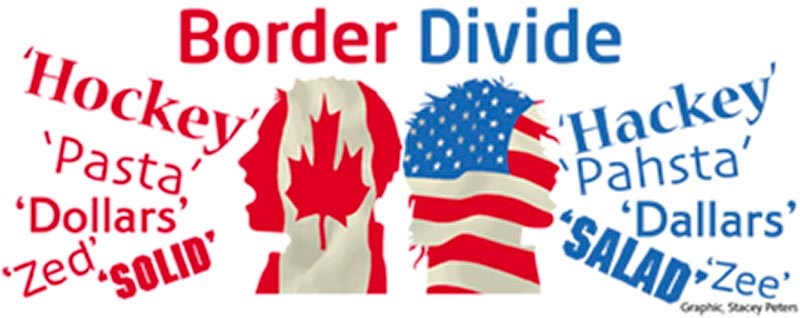As an American who visits Sarnia frequently Bill Miskell is struck by the differences in speech between here and Port Huron.
Though separated only by a narrow river the two cities have surprisingly different linguistic traits.
“The big one for me is how you say “out” and “about,” and the way you use ‘eh’ at the end of sentences,” Miskell said. “There are a lot of differences.”
For example, Sarnians pronounce the ‘a’ in the words “pasta,” “drama” and “plaza” the same way they say “fast” and “cat.”
But that’s foreign to Michiganders, who pronounce the same words “pahsta” and “drahma” and “plahza.”
Canadian English, as Miskell noted, is famous for the “ou” sound in “out and about,” which tends to come out “oat and aboat.”
“Then there’s the different spellings,” said Miskell, a Port Huron psychologist, business owner and chair-elect of the Blue Water Area Chamber of Commerce. Canadians add the letter ‘u’ to words like “colour” and switch the ‘e’ and ‘r’ in words like “theatre,” he said.
“I have a friend in Toronto who explained how Canada got its name. They put a bunch of consonants in a bowl and pulled out a “C” eh, then an “N” eh, and a “D” eh.”
Noted Canadian linguist Charles Boberg said the curious divide is rooted in history.
Sarnia’s speech patterns, like the rest of Southern Ontario, can be traced to the United Empire Loyalists, who moved north from the U.S. about 200 years ago and left a lasting imprint, said Boberg, associate professor of linguistics at McGill University in Montreal.
Port Huron residents, on the other hand, speak with a regional accent called the “inland northern,” which covers the southern Great Lakes from Milwaukee to Buffalo. In Port Huron the word ‘sock’ is pronounced ‘sack’ and ‘solid’ becomes ‘salad.’
Sarnians play hockey not "hackey" and spend dollars not "dallars."
“Everyone, everywhere in the world thinks their English is normal and the English of other people is strange,” said Boberg, who was born in the U.S. to a Canadian father and British mother.
Children learn the pronunciation of words from their peers, especially at school. Although mass media and travel to the U.S. can influence the way we speak, their impact is stronger on adults than children, said Boberg, author of The English Language in Canada: Status, History and Comparative Analysis
Some of our language is also a conscious effort to preserve a distinct Canadian identity against an onslaught of U.S. popular culture, he added.
For example, we insist on pronouncing the letter “Z” as “Zed” and not “Zee.” And we still visit the washroom in Sarnia, not the restroom, as they do in Port Huron.
- George Mathewson
